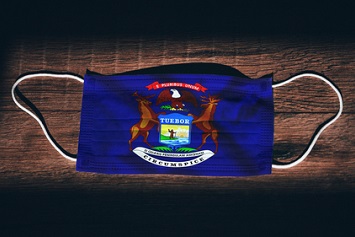The Michigan Occupational Safety and Health Administration (MIOSHA) released an interim enforcement plan, incorporating the state’s emergency coronavirus disease 2019 (COVID-19) rules put into place last month. COVID-19 is a respiratory disease caused by the SARS-CoV-2 virus.
Michigan became the second state, following Virginia, to issue emergency COVID-19 regulations. Oregon became the third state when it issued emergency rules last week.
The World Health Organization (WHO) on March 11 declared the COVID-19 outbreak a global pandemic.
Michigan’s emergency rules remain in effect until mid-April 2021, unless revised or withdrawn. MIOSHA’s interim enforcement plan establishes agency policies and procedures for investigating hazards related to SARS-CoV-2 and COVID-19. The plan applies to MIOSHA’s construction and general industry divisions.
The plan includes procedures for employee complaints; referrals from employers, local public health departments, and the occupational and environmental medicine department at Michigan State University; and COVID-19 fatalities reported by employers and in the media.
Most complaints and referrals involving workplaces with medium and lower exposure risks will be handled with a COVID-19 Recommendation Letter. The enforcement plan includes a template for those letters. MIOSHA personnel are instructed to attempt to negotiate an agreement on steps the employer will take to comply with the state COVID-19 regulations.
The agency may perform a telephone inspection to assess an employer’s compliance but can initiate an on-site inspection following a COVID-19 fatality or if an employer fails to provide a satisfactory response during a telephone inspection.
On-site COVID-19 inspections typically will be performed by agency industrial hygienists. Violations that occurred before October 15 are cited under Michigan’s General Duty Clause to provide a workplace free of recognized safety and health hazards. Violations occurring after that date are cited under the state’s emergency COVID-19 regulations. Employers also may be cited for violations of the state’s personal protective equipment, respiratory protection, sanitation, and recordkeeping and reporting regulations.
Industrial hygienists in the general industry division typically will perform COVID-19 inspections in general industry, and construction division hygienists will perform inspections in the construction industry. Safety officers may perform inspections in low and medium exposure risk workplaces. In the event of a high volume of complaints and referrals, inspections may be assigned to safety officers and hygienists in the construction division.
COVID-19 also will be addressed during other types of inspections. For example, agency hygienists and safety officers may cite an employer if they observe customers or employees without face coverings or a lack of required signs.
During an on-site inspection, the agency industrial hygienist will determine the following:
- Approximate date of the employee’s exposure to SARS-CoV-2, typically 4–14 days before the onset of symptoms;
- Benchmark for compliance at the time of employee exposure, either the state Emergency COVID-19 Rules (October 15 or later) or COVID-19 guidance from the Centers for Disease Control and Prevention (CDC) and federal Occupational Safety and Health Administration (OSHA);
- Whether the employer is presently following the Emergency COVID-19 rules;
- Whether the employer was following the applicable benchmark for compliance at the time of the employee’s exposure; and
- Whether to classify an inpatient hospitalization for COVID-19 as work-related.
If there are violations found during an on-site COVID-19 inspection, the industrial hygienist will propose citations under the Emergency Rules, other applicable MIOSHA regulations, or the state’s General Duty Clause.

